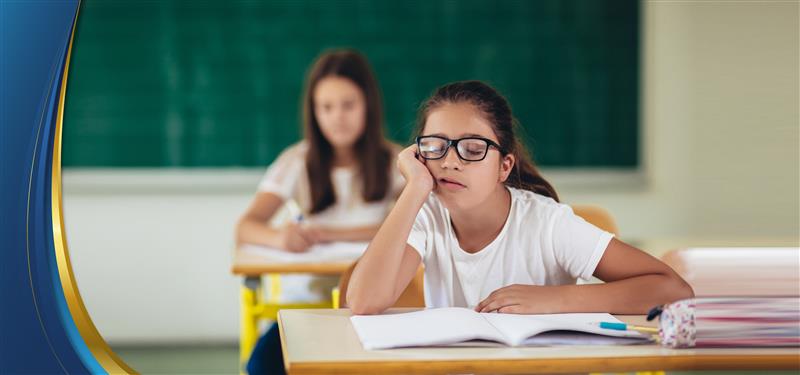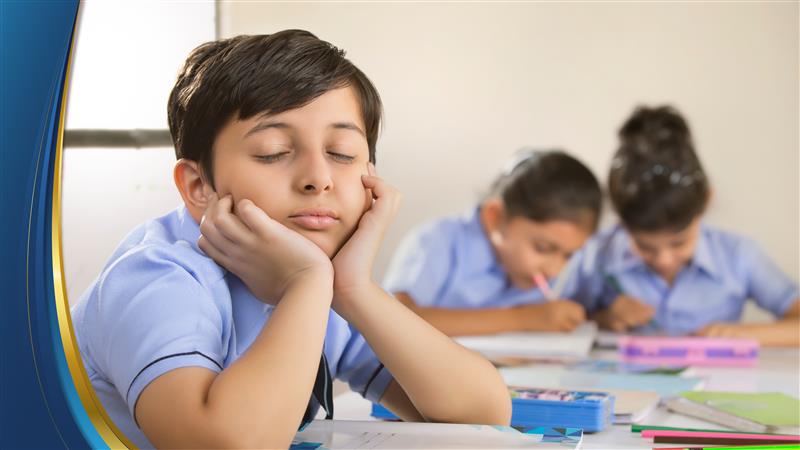How does lack of sleep affect children’s studies?

There is a silent classroom struggle that is prevalent: It is called sleep deprivation. The child’s brain cannot focus when the head is on the desk. It is a clear message related to the effects of lack of sleep on children.
In the Shri Ram Universal School, Bangalore, we are happy when children are fresh and ready to face a new day to study.
This article is a small snapshot about the importance of sleep for students. It will assist parents and children in avoiding health problems. As one of the best schools in North Bengaluru, we urge parents to give sleep the priority it deserves in their child’s life.
In the chaos of busy city life, children suffer from insufficient sleep. It is a critical issue that silently undermines their academic potential. Imagine a young girl Meenakshi, just ten years old, struggling to keep her eyes open during a mathematics lesson. She had tossed and turned the previous night. Her mind racing with screen time and late-night digital distractions. Her exhaustion is more than just temporary fatigue; it’s a profound disruption to her cognitive development and learning capabilities.

Effects of lack of sleep on children distract them from studies
The effects of inadequate sleep on children’s academic performance are deeply concerning:
- Reduced Cognitive Function: Sleep deprivation impairs memory consolidation, making it challenging for children to retain and recall information learned during the day.
- Decreased Concentration: Tired children find it incredibly difficult to focus, often appearing distracted and unable to engage meaningfully in classroom activities.
- Emotional Instability: Lack of sleep leads to increased irritability, mood swings, and heightened emotional responses, which can disrupt learning environments.
- Impaired Problem-Solving Skills: Without proper rest, children’s ability to think critically and solve complex problems becomes significantly compromised.
- Physical Exhaustion: Chronic sleep deprivation results in physical fatigue. It reduces children’s participation in academic and extracurricular activities.
When sleep is compromised, children from primary school youngsters to teenagers suffer. Insufficient rest transforms bright, potential-filled students into cranky, underperforming individuals.
In classrooms, these children struggle to maintain attention, participate in discussions, and complete assignments effectively. Their academic performance declines, not because of a lack of intelligence, but due to inadequate rest.

Importance of sleep for students nurture their waking period
Conversely, quality sleep is a powerful catalyst for holistic child development. Good sleep patterns promote numerous positive outcomes:
- Enhanced Learning Capacity: Well-rested children demonstrate improved information absorption and faster cognitive processing.
- Emotional Regulation: Adequate sleep helps children manage emotions more effectively, creating a positive and receptive learning mindset.
- Physical Growth and Repair: During sleep, children’s bodies release growth hormones essential for physical and mental development.
- Creativity and Innovation: Proper rest stimulates imagination, allowing children to approach problems with fresh, innovative perspectives.
- Improved Behaviour and Social Interactions: Children who sleep well are more patient, empathetic, and able to engage constructively with peers and educators.
Sleep deprivation is a significant impediment to children’s academic and personal growth. The brain requires consistent and quality rest to function optimally. This is particularly crucial for school students.
Parents must prioritise establishing healthy sleep habits: minimise screen time before bed and create a conducive sleep environment. It is important to develop consistent bedtime routines and ensure children get adequate rest.
Let children wake up refreshed, their minds clear, and ready to embrace the day’s learning adventures. A good night’s sleep is restful and helps in turning their dreams into reality.



